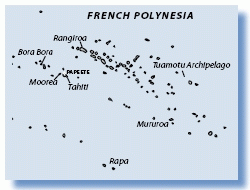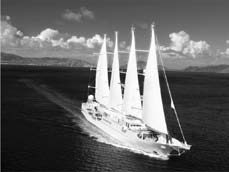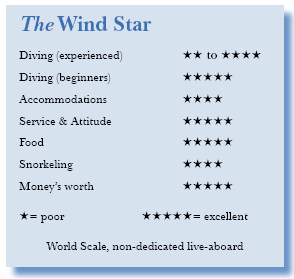Windstar’s French Polynesia:Contents of this Issue: Should We Dive with Overfilled Tanks? The Certified Diver’s Handbook They Sting, Itch, and Raise Angry Welts The Plot for Your Next Pulp Fiction Novel UWATEC Settles Over Dive Computer Editorial Office: Ben Davison Publisher and Editor Undercurrent 3020 Bridgeway, Suite 102 Sausalito, CA 94965 — a pearl of a trip for divers and nondivers from the May, 2005 issue of Undercurrent
Dear Fellow Diver: Our inflatable slogged out to the mooring beyond the reef and tied on. I descended in chunky water through rich, coral-encrusted sloping fingers, canyons, and rocky rubble to a gently sloping sand bottom at 90 ft. A couple of blacktip reef sharks swam about. Dropping to 70 feet, I saw a large lemon shark cruise by, like a large cloud driven by a gentle breeze; she was curious, and I kept station with her for a few minutes I'll forever treasure. Yes, there is unique and often exciting diving in French Polynesia – Americans usually lump the archipelago under the name” “Tahiti” – from land-based CMAS and PADI centers. Accommodations range from sprawling resorts starting at $400/day down to homey family offerings like Hotel Les Tipaniers on Moorea, where the intrepid can hire a bare or crewed boat. But there's another option: Wind Star, a modern, four-masted, 440- foot, 148-passenger ship that could well be the world's largest live-aboard. And, when wind conditions are right, which was about 1/3 of the time, motors automatically hoist the sails! Most passengers are not divers, but there are usually a few who are certified. For the nondiver, there is snorkeling, windsurfing, kayaking, and water skiing. Land excursions range from horseback rides, beach picnics, and island tours to historical sites and ancient “maraes” (temples). At night, the boat moves to another island for another adventure. Cruising these islands is cheaper than flying between
them in mosquito-sized aircraft with diminutive baggage
allowances. For one price (plus alcohol), I had a great white Taj Mahal with sails, gourmet meals,
24-hour cabin service and between-meal dining.
My dives ranged from rip-roaring worldclass drifting at Tiputa Pass at Rangiroa in the Tuamotu Archipelago, with swarms of gray reef sharks, tuna, barracuda and spotted eagle rays, to sedate reef dives with decent coral and a richness of reef fishes. At Fa'a Miti I spent 50 minutes at 45 ft. watching hawkfishes, myriads of angels and butterflyfishes, surgeons and triggerfish on a spur-and-groove slope with diverse corals. Outside the reef at Teavapiti Pass at Raiatea, an outgoing current and a three-foot swell made for surge as deep as sixty feet. Gray reef sharks, schools of big-eyed jacks, chevron barracudas and hungry-looking dogtooth tunas kept me wideeyed – a great dive, action-packed with even a few blacktip and whitetip reef sharks. Upon boarding the ship, I registered, then presented my diving credos. The ship has two PADI dive instructors, Crispin and Michelle, a young, enthusiastic and experienced Kiwi couple who double as the water sports and exercise group staff. Before dinner the first night, they gathered certified divers and students for standard PADI paperwork. I signed the hold-harmless release, showed my C-card, and listened to a briefing. (They hold separate meetings and separate dives for the resort coursers.) Next morning in the small pool topside, I and the others demonstrated mask replacement and second stage retrieval. Wind Star's policy is six divers max with each divemaster for experienced divers, four divers per divemaster for novices. On my trip, there were 18 divers for 12 spots on most dives (plus some leftover spots when divers completing certifications were scheduled), which generated some bad feelings, though they are generally good at getting experienced divers the dives they want. Wind Star can promise more than it can deliver: if a large number of divers shows up for a cruise and they all want the same dives, some will be unhappy. And those who arrive late, miss briefings or take the initial “no” as immutable can be left out of a dive or two. Nonetheless, I got in twelve dives on the nine days diving was offered, about what I expected. The dive deck has twin gear-rinse tanks, but no separate provisions for photo/video gear. Dives are expensive at $70/ tank, but you don't have to bring your gear since they include well-maintained Sherwood Silhouette BCDs and Brut regulators with octopus and basic gauges, but no computers. All gear is handled by dive staff, and they help divers into rigid-bottom Novurania inflatables, or RIBs, that hold six divers and boatman cozily. After the dive, the crew took weight belts and BCDs and helped us over the gunwale or up small ladders. Tanks are aluminum 80s filled to 3,000 psi, and no-decompression limits are enforced. On the first dive they apprise divers for challenging sites (and some didn't pass muster). Our group was initially limited to 95 ft., then when we showed our colors, max depth was 160 ft. Normal cruises are seven days, but I embarked on the 11-day Christmas cruise that included the spectacular dive destination of Rangiroa in the Tuamotu Archipelago, where the Tahiti Aggressor was anchored. At two passes, Avatoru and Tiputa, I rode wild incoming current bores up to six knots and saw mantas, hammerheads, sailfish, and dolphins. Venerable Napoleon wrasses and sharks thrive under the protection of the islanders. (The people of Rangi believe sharks are the spirits of their ancestors.) My “white Christmas” was about stretches of white sand on stunning Bora Bora. At Toopua Coral Gardens, I dropped into a shallow coral garden, surrounded by swarms of colorful fishes that sometimes get fed. As I began to drift, football-shaped mustachioed titan triggerfish were pairing up. While they were blowing holes in the sand for nests, they were also in-yourface with divers. I examined a forest of huge anemones, condos for families of orange bicinctus anemonefish with their showy twin bluish vertical stripes. A large spotted eagle ray swam toward me, and I saw a large Napoleon wrasse. Under ledges I spotted spotfin lionfishes, big-eyed and Bikini squirrelfishes, and a lonely remora that tried to attach itself to me. Sooner than I wanted, I was ascending among yellowtail and rainbow wrasses, butterflyfishes and angels among the boulders of Christmas morning in paradise, ornamented with a kaleidoscope of fishes of every color and shape — no tree could ever be as colorful.
For my second, 45-minute tank, we RIBbed out of Teavanui Pass and beyond the surf line to “Tapu,” a dive site with canyons and rubble. As I headed down the buoy line to 95 ft., I saw a healthy school of big-eyed trevally, free-swimming remoras, tough-guy bar jacks, and a couple of inquisitive blacktip reef sharks, then was cruised by three large lemon sharks in the pronounced surge. Shining my dive light under ledges revealed chocolate-brown Pterois radiata lionfish and many reef fishes. Water is about 80° F. all year, visibility ran 60-100 ft. except inside lagoons or passes where it was in the 40-50 ft. range. At Rangiroa, we departed at 7:30 a.m. to dive with a land-based operation, Top Dive. In their capable RIBs, we paralleled the shore, navigating the incoming currents in Tiputa Pass. I backrolled into the water about 150 yards south of the pass mouth, dropping to the lush hard coral garden below. As I drifted with the light current, swarms of schooling bannerfish, pyramid butterflyfish, and others sprinkled the corals like giant spangles with their color, and the occasional titan triggerfish poked about. Soon the walls began losing coral growth and became more cobbled and barren. The current rushed me toward that insatiable mouth feeding the lagoon. I joined dogtooth tuna, groups of large spotted eagle rays, swirling schools of Heller's barracuda, and at the funnel entry to the pass, a swarm of gray reef sharks. Then a huge great hammerhead emerged from the depths. I was flying, the broad V-shaped channel below looking like the scoured bottom of a river. Indeed a great ride, a great dive. Currents can be unpredictable, even undiveable, but when planned properly, riding the incoming tidal bore through the pass is a world-class express train ride with plenty of interesting companions.
If I did both dives, I missed the 8-10 breakfast, though I had more than enough food at the early Continental layout – fresh juice and fruit, breads, cheese and coldcuts, excellent coffee. A few divers had cabin service breakfast. A delicious buffet lunch is on the Verandah at 12:30-2:00. I enjoyed shrimp remoulade, cucumber salad, delicious New Zealand green-lipped mussels in a white wine sauce and dessert, all well-prepared and abundant. The formal “linens and crystal” restaurant is open for “as you like it” seating for dinner, served by a friendly staff, from 7:30-9:30 pm. Meals are fabulous, and a wide selection of wines is available. One night I began with gazpacho, Parma-ham-wrapped romaine lettuce with dressing and polenta croutons, and duck in black cherry and red wine sauce with mashed potato and spinach. Hot chocolate soufflé cake with raspberry coulis with a nice decaf ended the meal. You get the idea. And, each evening a versatile couple provided music; there were a couple of Polynesian cultural shows and a visiting revue. Or one could drop a few bucks in the small casino. The 73 well-designed and spacious cabins are identical, except for the owner's cabin and seven with a third bunk for families. The typical cabin is large and fully equipped, with a twin-porthole window, climate control and an innovative bathroom that feels spacious in a small space, plus twicedaily towel and cabin service. With ninety passengers, the 92 crew members outnumbered us. While there were some international travelers and savvy young couples, it was mostly an American crowd in the 40 to 60-year-old range. Officers were generally Brits; staff members were friendly and service-oriented Indonesian and Filipino. Obviously, Wind Star is not a four-dive-a-day hardcore live-aboard. However, for those traveling with nondivers or interested in a pampered voyage through famed, exotic isles aboard a top-notch, floating dive resort, this can't be beat. |

I want to get all the stories! Tell me how I can become an Undercurrent Online Member and get online access to all the articles of Undercurrent as well as thousands of first hand reports on dive operations world-wide
| Home | Online Members Area | My Account |
Login
|
Join
|
| Travel Index |
Dive Resort & Liveaboard Reviews
|
Featured Reports
|
Recent
Issues
|
Back Issues
|
|
Dive Gear
Index
|
Health/Safety Index
|
Environment & Misc.
Index
|
Seasonal Planner
|
Blogs
|
Free Articles
|
Book Picks
|
News
|
|
Special Offers
|
RSS
|
FAQ
|
About Us
|
Contact Us
|
Links
|
3020 Bridgeway, Ste 102, Sausalito, Ca 94965
All rights reserved.

 “Casual elegance” is the byword: no
dress-up parties, but no jeans at dinner.
“Casual elegance” is the byword: no
dress-up parties, but no jeans at dinner.
 Our group ranged from divers with
decades of experience to those who
had not dived in eight years. The
first dive of the day, about 8 a.m.,
is for certified divers; the second,
for students, is at 10 a.m.
(unfilled spots can be filled by
certified divers to the max of 12).
On this cruise, seven regular dives
were scheduled and I joined five of
the six student trips.
Our group ranged from divers with
decades of experience to those who
had not dived in eight years. The
first dive of the day, about 8 a.m.,
is for certified divers; the second,
for students, is at 10 a.m.
(unfilled spots can be filled by
certified divers to the max of 12).
On this cruise, seven regular dives
were scheduled and I joined five of
the six student trips. Diver's Compass: April-September is the dry season; typhoons
infrequent... The nearest chamber is in Papeete, and French
Polynesia is well set up for air evacuation... Discover
Scuba Diving instruction and pool session cost $70, dives
$70/tank. No Nitrox, no E-6 processing ... Windstar offers
Caribbean and Costa Rica cruises, including Honduras and
Belize; locations and times vary. Trip cost for the 11-day
Christmas cruise lists at $3976 per person, air included, with an advance purchase discount. . . . Air New Zealand and Air Tahiti
fly from Los Angeles. Round trip fares begin at $832. Windstar Cruises,
phone (800) 544-0443, fax (206) 286-3288, e-mail
Diver's Compass: April-September is the dry season; typhoons
infrequent... The nearest chamber is in Papeete, and French
Polynesia is well set up for air evacuation... Discover
Scuba Diving instruction and pool session cost $70, dives
$70/tank. No Nitrox, no E-6 processing ... Windstar offers
Caribbean and Costa Rica cruises, including Honduras and
Belize; locations and times vary. Trip cost for the 11-day
Christmas cruise lists at $3976 per person, air included, with an advance purchase discount. . . . Air New Zealand and Air Tahiti
fly from Los Angeles. Round trip fares begin at $832. Windstar Cruises,
phone (800) 544-0443, fax (206) 286-3288, e-mail 